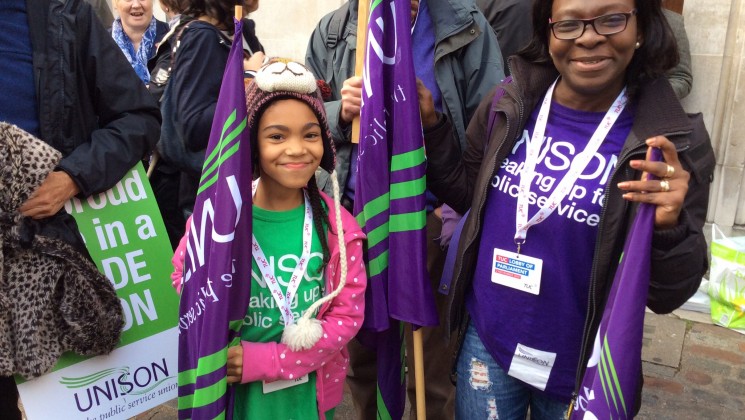“This hard-line trade union bill attacks every worker in this country, union member or not. It’s a bill that is stuck in the past, outdated and not fit for purpose,” said UNISON general secretary Dave Prentis, speaking at a rally against the bill today in London.
But, he said, UNISON will continue to fight it.
“We’ll fight for the underdog, the poor, those who can’t stand up for themselves,” against a bill he described as “cruel, wrong, immoral.”
He followed speakers from across the union and civil liberties movement, including TUC general secretary Francis O’Grady who condemned the “shambles of a bill” and Shami Chakrabarti of human rights group Liberty, who reminded the rally: “Dissent is not disloyalty, and the oldest trick in the book is divide and rule.
“The government is dividing the public and trade unionists.” But, she asked, “Who are trade unionists if not the public?”
TUC president and UNISON assistant general secretary Liz Snape vowed to persuade MPs across the political spectrum that “the trade union bill is wrong. It’s unfair and an attack on our civil liberties.
“Whatever barriers they put in our way, they’ll never stop our movement fighting for a fairer Britain.”
The trade union bill is currently being rushed through Parliament and UNISON believes it is unnecessary, unfair and undemocratic:
- attacking the rights of workers to take strike action;
- putting a stop to facility time – the time union reps use to represent their members;
- allowing nexperienced agency workers to be brought in to cover workers on strike.
Thousands of trade union members had travelled to London to attend the rally, speak up in favour of their rights at work and to speak to their MPs about the bill.
Walking the length of the lobby queue and stopping to talk to UNISON branch representatives, Mr Prentis said: “It is fantastic to see our members standing up for their trade union rights.
“Everyone here today recognises that this government is trying to stifle the voices of working people and we cannot let that happen.
“The turnout from UNISON today shows we are determined to continue to speak up for our members and the public services they provide.”
UNISON member Rory Shannon had travelled from Birmingham where he works as a catering manager at the university.
He is also being an ex-Labour councillor and West Midlands co-convenor for the regional UNISON LGBT group.
He reported having made several attempts to arrange a meeting with his local MP Sajid Javid, the minister in charge of the bill, without receiving a response.
If Mr Javid had agreed to meet him his message would have been: “Why? Why are you pushing this through? No ones asked for it, even your own MPs have their doubts.
“We’ve only been on strike twice in the last 35 years,” said Mr Shannon, “and one of those times we won the living wage.
“It’s a tough decision to make, especially if you’re below the living wage, losing a day’s pay could mean losing a meal for your family.”
Heidi Garside, a prosecution team officer, had travelled from Huddersfield with her colleagues Sue Kelsey, Amanda Rushton and Tracey Scothern.
“They’re trying to take us back to Victorian times,” said Ms Garside. “Annual leave, sick pay, maternity leave: these were fought for by trade unions.
“We aren’t the evil organisation the governments making us out to be. We’re the organisation that fights for working people.”
Ms Rushton was paying a visit to her MP Andrea Jenkyns. Remembering the help she’d received from her UNISON rep when she’d taken out a grievance over her terms and conditions, she feared the consequences of taking away facility time.
Theatre nurse Eleanor Smith explained: “Going on strike is not a decision I ever thought I’d make in my nursing career – but we were backed into a corner.
“On the day we went on strike, we worked with management, we said ‘if an emergency comes through the door we’ll drop our picket and we’ll be there.'”
The employer came back to the negotiating table, explained Ms Smith: “Strike action’s a last resort, but we need it.”
“Social work is a serious job and they’re not taking it seriously” said Aleksandra Mark-Rybner, attending the rally with her social worker mum Kathy.
“We’re here to support workers,” continued Kathy, but the government would “restrict us in helping other people in trouble.”


